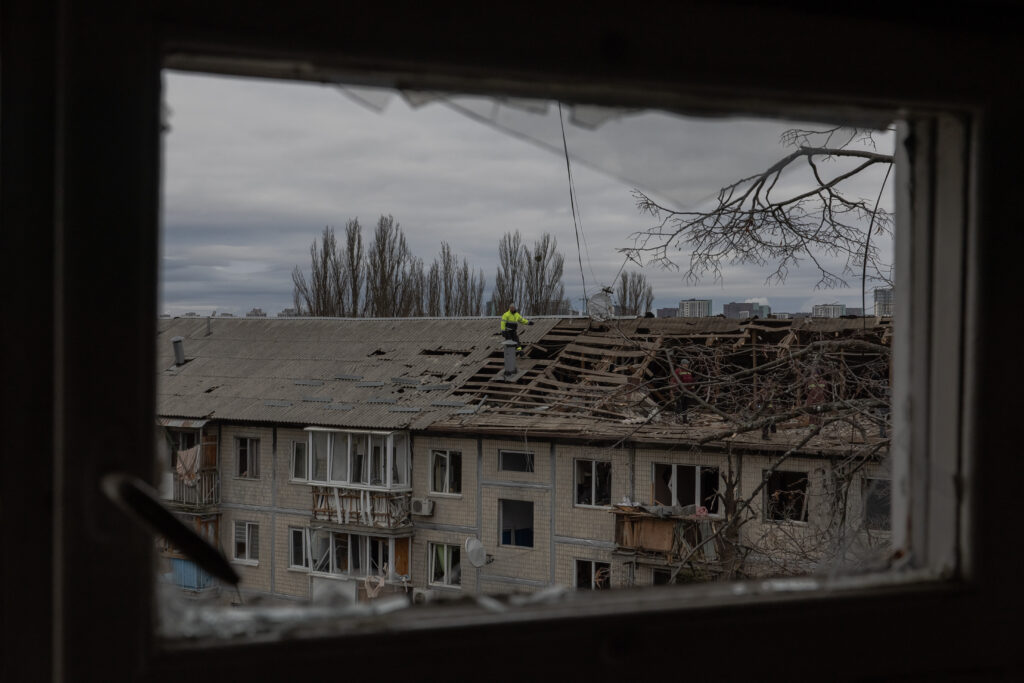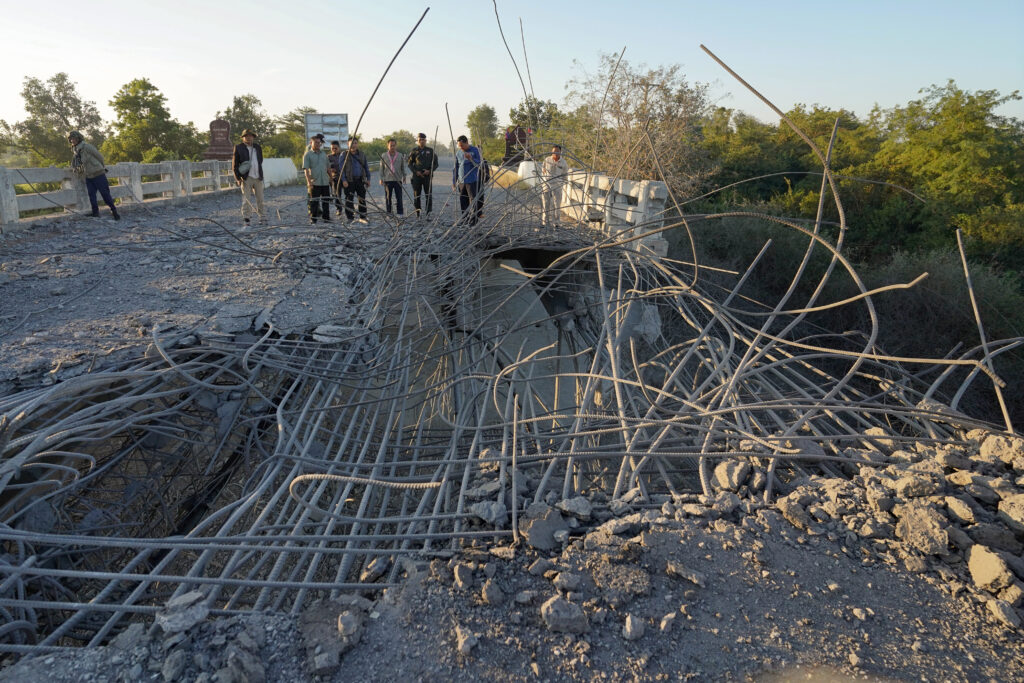Wagner stronghold in CAR holds the line despite Kremlin shakeupTue, 23 Dec 2025 13:08:22 GMT
A mural depicting Vladimir Putin and fatigue-clad Russian paramilitary fighters has appeared in the Central African Republic ahead of presidential and parliamentary elections as the country seeks to recover from decades of violence.The Russian embassy in Bangui called the work of a local artist that also features President Faustin-Archange Touadera and CAR military officers “a …
Springbok captain Kolisi to rejoin StormersTue, 23 Dec 2025 12:51:23 GMT
South Africa’s two-time World Cup winning captain Siya Kolisi will return to the Stormers in July 2026, the Cape Town-based franchise announced on Tuesday. The Springboks’ first black Test captain began his career with Stormers before moving to the Durban-based Sharks in 2020. After a mediocre season with Racing 92 in the French Top 14 and with …
Springbok captain Kolisi to rejoin StormersTue, 23 Dec 2025 12:51:23 GMT Read More »
La Poste : la cyberattaque “toujours en cours” malgré un retour progressif de l’accès aux services
La Poste a indiqué mardi midi que la cyberattaque qui a touché lundi les services en ligne de suivi du courrier et de banque en ligne “est toujours en cours” mais la distribution du courrier et des colis “se déroule normalement à ce stade”.”L’accès à nos services en ligne s’est amélioré, mais la situation demeure instable”, expose l’opérateur postal dans un point de situation publié à 12h30. Le communiqué fait état de “difficultés” persistantes concernant notamment “l’accessibilité des centres d’appel”. En revanche, les facteurs ont pu “partir en tournée ce matin” pour livrer les colis et les courriers attendus pour Noël. “La distribution se déroule normalement à ce stade”, précise La Poste, qui évoque un contexte “très difficile”.La cyberattaque intervient en effet au début de la semaine des fêtes de fin d’année, période la plus dense pour La Poste. Sur les deux derniers mois de l’année, le groupe trie et distribue 180 millions de colis.Plus tôt dans la matinée, le ministre de l’Economie Roland Lescure a affirmé sur BFMTV/RMC que “la priorité des priorités, c’est de faire en sorte que les colis arrivent à temps pour Noël”.Dans un bureau de poste du 2e arrondissement de Paris, l’AFP a constaté que le service n’était que marginalement perturbé. La réception des colis était assurée et le courrier distribué. Seul le suivi des colis restait inopérant.Au comptoir, Monique Petit, 69 ans, un paquet sous le bras à destination de Nantes, s’estime “peu inquiète” concernant l’acheminement de son colis. “Tout a l’air de fonctionner normalement. C’est un cadeau de Noël pour ma fille, j’espère qu’elle l’aura dans les prochains jours”, explique-t-elle. “On m’a indiqué que le suivi de colis ne fonctionne pas, mais je passerai un coup de téléphone pour savoir s’il est arrivé”, ajoute-t-elle.A midi, La Poste assurait que l’activité de banque en ligne avait repris, malgré des “ralentissements” sur le site. L’application La Banque Postale affichait pourtant un “service momentanément indisponible”, a constaté l’AFP.La Poste parle d’un incident de type “déni de service”. Ce dernier consiste à surcharger des sites web et des applications par des requêtes ciblées de telle sorte qu’ils ne soient plus accessibles. Le groupe a assuré lundi qu’aucune donnée sensible n’a été volée.
La Poste : la cyberattaque “toujours en cours” malgré un retour progressif de l’accès aux services
La Poste a indiqué mardi midi que la cyberattaque qui a touché lundi les services en ligne de suivi du courrier et de banque en ligne “est toujours en cours” mais la distribution du courrier et des colis “se déroule normalement à ce stade”.”L’accès à nos services en ligne s’est amélioré, mais la situation demeure instable”, expose l’opérateur postal dans un point de situation publié à 12h30. Le communiqué fait état de “difficultés” persistantes concernant notamment “l’accessibilité des centres d’appel”. En revanche, les facteurs ont pu “partir en tournée ce matin” pour livrer les colis et les courriers attendus pour Noël. “La distribution se déroule normalement à ce stade”, précise La Poste, qui évoque un contexte “très difficile”.La cyberattaque intervient en effet au début de la semaine des fêtes de fin d’année, période la plus dense pour La Poste. Sur les deux derniers mois de l’année, le groupe trie et distribue 180 millions de colis.Plus tôt dans la matinée, le ministre de l’Economie Roland Lescure a affirmé sur BFMTV/RMC que “la priorité des priorités, c’est de faire en sorte que les colis arrivent à temps pour Noël”.Dans un bureau de poste du 2e arrondissement de Paris, l’AFP a constaté que le service n’était que marginalement perturbé. La réception des colis était assurée et le courrier distribué. Seul le suivi des colis restait inopérant.Au comptoir, Monique Petit, 69 ans, un paquet sous le bras à destination de Nantes, s’estime “peu inquiète” concernant l’acheminement de son colis. “Tout a l’air de fonctionner normalement. C’est un cadeau de Noël pour ma fille, j’espère qu’elle l’aura dans les prochains jours”, explique-t-elle. “On m’a indiqué que le suivi de colis ne fonctionne pas, mais je passerai un coup de téléphone pour savoir s’il est arrivé”, ajoute-t-elle.A midi, La Poste assurait que l’activité de banque en ligne avait repris, malgré des “ralentissements” sur le site. L’application La Banque Postale affichait pourtant un “service momentanément indisponible”, a constaté l’AFP.La Poste parle d’un incident de type “déni de service”. Ce dernier consiste à surcharger des sites web et des applications par des requêtes ciblées de telle sorte qu’ils ne soient plus accessibles. Le groupe a assuré lundi qu’aucune donnée sensible n’a été volée.
Ukraine: des frappes russes visent le secteur énergétique, deux jours avant Noël
Des frappes russes d’ampleur ont visé mardi le secteur énergétique ukrainien, tuant trois personnes et provoquant de nouvelles coupures de courant à deux jours de la fête de Noël, alors que les négociations sur une fin des hostilités progressent lentement.Ces derniers mois, la Russie a frappé à de multiples reprises les infrastructures électriques et gazières de l’Ukraine, mettant à rude épreuve le réseau énergétique en plein hiver.Dans la nuit de lundi à mardi, elle a visé le pays avec 635 drones et 38 missiles, dont respectivement 587 et 34 ont été abattus, selon les chiffres de l’armée de l’air ukrainienne.Le président Volodymyr Zelensky a fait état de treize régions du pays visées, dont la capitale Kiev, où l’alerte antiaérienne a sonné pendant plus de quatre heures mardi matin.Trois personnes ont été tuées: une dans la région de Kiev, une autre dans celle de Khmelnytsky (ouest) et une fillette dans celle de Jytomyr (centre-ouest), selon les autorités locales. Plus de dix personnes, dont des enfants, ont été blessées.”La Russie attaque une fois de plus nos infrastructures énergétiques. En conséquence, des coupures de courant d’urgence ont été déclenchées dans plusieurs régions d’Ukraine”, a annoncé le ministère de l’Énergie.Selon la Première ministre, Ioulia Svyrydenko, les régions occidentales de l’Ukraine ont été les plus touchées cette fois-ci.”Le moment choisi pour cette attaque – deux jours avant Noël et pendant la première vague de froid prolongée de l’hiver – souligne la stratégie cynique de la Russie”, a dénoncé l’opérateur électrique privé DTEK.- “Assis dans le noir” -La région méridionale d’Odessa, frappée à plusieurs reprises ces dernières semaines en réponse à des attaques ukrainiennes sur des pétroliers liés à la Russie en mer Noire et Méditerranée, a aussi été visée.Olena Dolkhatchova, une enseignante de mathématiques de 40 ans, a raconté à l’AFP devoir désormais travailler à la lumière des bougies.”Il y a des attaques chaque semaine. À peine le courant est-il rétabli que tous (…) nous nous retrouvons sans électricité, sans stabilité, assis dans le noir pendant deux ou trois jours”, témoigne-t-elle.Les coupures signifient que ses élèves sont souvent privés de cours en ligne. “Malgré tout, nous travaillons, nous enseignons (…) Nous n’abandonnons pas”, a-t-elle poursuivi.Selon Anastassia Koulakivska, gérante d’un salon de beauté, “sept jours sans électricité sont devenus la norme à Odessa”.”La maison se refroidit très rapidement” sans chauffage, regrette-t-elle, décrivant ses efforts pour conserver ses médicaments à la bonne température sans réfrigérateur et utilisant un générateur pour les besoins de sa famille.”C’est une question de santé”, explique-t-elle. “Par exemple, lorsque votre enfant est malade, vous devez brancher un inhalateur, et celui-ci ne peut pas fonctionner avec des piles”.- “Juste avant Noël” -Comme lors des précédentes frappes, le ministère russe de la Défense a indiqué avoir frappé “des entreprises du complexe militaro-industriel ukrainien et des installations énergétiques assurant leur fonctionnement”.Sur X, l’armée polonaise a annoncé mardi matin que son aviation avait été mise en alerte et déployée dans son espace aérien de manière préventive en raison des frappes russes sur le territoire ukrainien.Cette procédure est régulièrement enclenchée lorsque les bombardements visent des zones occidentales proches de la frontière polonaise.Le président Volodymyr Zelensky a dénoncé “une attaque juste avant Noël, alors que les gens veulent simplement être avec leur famille, chez eux, en sécurité”. Il a estimé que ces frappes “envoient un signal extrêmement clair sur les priorités de la Russie”, au moment où Washington déploie des efforts diplomatiques pour mettre fin au conflit.Une série de rencontres séparées entre négociateurs russe et ukrainien et les Américains ont eu lieu pendant le weekend aux Etats-Unis. Si Kiev et Washington ont salué des échanges “productifs”, Moscou a fait état seulement de “lents progrès” et critiqué la position des Européens.Dans son allocution quotidienne lundi soir, le président ukrainien a affirmé qu’il serait informé mardi des résultats détaillés de ces discussions par ses négociateurs, de retour de Floride.Ces derniers “ont effectué un gros travail, avant tout sur les documents concernant les garanties de sécurité” qui seraient apportées à Kiev en cas d’accord, a déclaré M. Zelensky.En attendant un accord, sur le terrain, l’armée russe a poursuivi ses avancées. Elle a revendiqué mardi la prise de plusieurs localités dans les régions de Kharkiv (nord-est) et Dnipropetrovsk (centre-est).Les forces russes, qui occupent environ 19% du territoire ukrainien, ont accéléré leur progression sur le front ces derniers mois.
Mahrez eyes strong AFCON showing from AlgeriaTue, 23 Dec 2025 12:10:21 GMT
Algeria captain Riyad Mahrez is confident his side can make up for poor showings at the last two editions of the Africa Cup of Nations as the 2019 champions prepare to begin their campaign in Morocco on Wednesday.The Desert Foxes won their second AFCON title the last time it was played in North Africa, six …
Mahrez eyes strong AFCON showing from AlgeriaTue, 23 Dec 2025 12:10:21 GMT Read More »
Le co-créateur du jeu vidéo “Call of Duty” Vince Zampella meurt dans un accident de la route
Le co-créateur de “Call of Duty” Vince Zampella, figure majeure du jeu vidéo, est décédé dimanche à 55 ans dans un accident de voiture en banlieue de Los Angeles, a indiqué lundi l’éditeur Electronic Arts (EA).Vince Zampella était considéré comme un pionnier des jeux de tirs à la première personne, vendus à des centaines de …
La Thaïlande rejette la demande du Cambodge pour des pourparlers en terrain neutre
La Thaïlande a rejeté mardi la demande du Cambodge d’organiser en terrain neutre des pourparlers destinés à régler leur conflit frontalier, qui a fait plus de 40 morts et des centaines de milliers de déplacés en deux semaines.Les deux voisins d’Asie du Sud-Est avaient convenu lundi de se mettre autour de la table à partir …
La Thaïlande rejette la demande du Cambodge pour des pourparlers en terrain neutre Read More »








